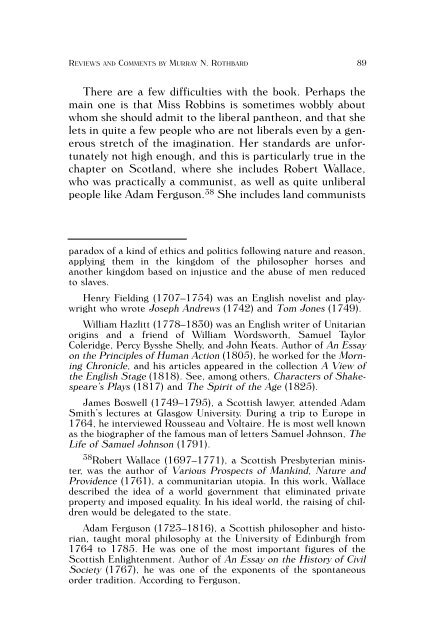Murray N. Rothbard vs. the Philosophers - Ludwig von Mises Institute
Murray N. Rothbard vs. the Philosophers - Ludwig von Mises Institute
Murray N. Rothbard vs. the Philosophers - Ludwig von Mises Institute
You also want an ePaper? Increase the reach of your titles
YUMPU automatically turns print PDFs into web optimized ePapers that Google loves.
REVIEWS AND COMMENTS BY MURRAY N. ROTHBARD 89<br />
There are a few difficulties with <strong>the</strong> book. Perhaps <strong>the</strong><br />
main one is that Miss Robbins is sometimes wobbly about<br />
whom she should admit to <strong>the</strong> liberal pan<strong>the</strong>on, and that she<br />
lets in quite a few people who are not liberals even by a generous<br />
stretch of <strong>the</strong> imagination. Her standards are unfortunately<br />
not high enough, and this is particularly true in <strong>the</strong><br />
chapter on Scotland, where she includes Robert Wallace,<br />
who was practically a communist, as well as quite unliberal<br />
people like Adam Ferguson. 38 She includes land communists<br />
paradox of a kind of ethics and politics following nature and reason,<br />
applying <strong>the</strong>m in <strong>the</strong> kingdom of <strong>the</strong> philosopher horses and<br />
ano<strong>the</strong>r kingdom based on injustice and <strong>the</strong> abuse of men reduced<br />
to slaves.<br />
Henry Fielding (1707–1754) was an English novelist and playwright<br />
who wrote Joseph Andrews (1742) and Tom Jones (1749).<br />
William Hazlitt (1778–1830) was an English writer of Unitarian<br />
origins and a friend of William Wordsworth, Samuel Taylor<br />
Coleridge, Percy Bysshe Shelly, and John Keats. Author of An Essay<br />
on <strong>the</strong> Principles of Human Action (1805), he worked for <strong>the</strong> Morning<br />
Chronicle, and his articles appeared in <strong>the</strong> collection A View of<br />
<strong>the</strong> English Stage (1818). See, among o<strong>the</strong>rs, Characters of Shakespeare’s<br />
Plays (1817) and The Spirit of <strong>the</strong> Age (1825).<br />
James Boswell (1749–1795), a Scottish lawyer, attended Adam<br />
Smith’s lectures at Glasgow University. During a trip to Europe in<br />
1764, he interviewed Rousseau and Voltaire. He is most well known<br />
as <strong>the</strong> biographer of <strong>the</strong> famous man of letters Samuel Johnson, The<br />
Life of Samuel Johnson (1791).<br />
38Robert Wallace (1697–1771), a Scottish Presbyterian minister,<br />
was <strong>the</strong> author of Various Prospects of Mankind, Nature and<br />
Providence (1761), a communitarian utopia. In this work, Wallace<br />
described <strong>the</strong> idea of a world government that eliminated private<br />
property and imposed equality. In his ideal world, <strong>the</strong> raising of children<br />
would be delegated to <strong>the</strong> state.<br />
Adam Ferguson (1723–1816), a Scottish philosopher and historian,<br />
taught moral philosophy at <strong>the</strong> University of Edinburgh from<br />
1764 to 1785. He was one of <strong>the</strong> most important figures of <strong>the</strong><br />
Scottish Enlightenment. Author of An Essay on <strong>the</strong> History of Civil<br />
Society (1767), he was one of <strong>the</strong> exponents of <strong>the</strong> spontaneous<br />
order tradition. According to Ferguson,


